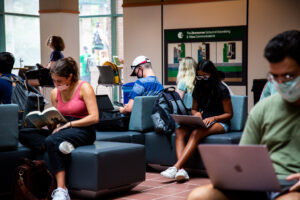COVID-19 guidelines leave some students conflicted

The decision to wear a mask and maintain social distance has come down to individuals per USF’s spring COVID-19 guidelines. Some students have welcomed the autonomy with appreciation, but others are concerned of the possible risk of spread due to a lack of campuswide protocols.
Students have recognized that the measures have not experienced much change since the fall semester, as the university still encourages vaccines and boosters, and expects students and faculty to wear masks while indoors.
“I feel like it’s mostly the same as last semester,” said psychology major Miriam Mami. “Professors will mention to wear a mask, but it’s not enforced or anything.”
First-year physical science major Sophie Pfeiffer said she appreciated these guidelines, as they allowed students to enjoy the campus experience while still remaining safe.
“I’m pretty OK with [the guidelines] because I appreciate that the campus is still taking it quite seriously … it obviously is a serious thing,” said Pfeiffer. “But I also appreciate that they’re not restricting a lot of our ability to still interact with others and really just experience the campus as a whole.”
A major change in the COVID-19 guideline updates was the process to report new cases. As of Jan. 3, positive cases will no longer be reported to the USF COVID-19 Assessment Team. Instead, they will only be reported to the Florida Department of Health, according to the COVID-19 Information and Resources page on the university website.
First-year English and biology major Olivia Nolan said the change was upsetting, as it caused friends affected by COVID-19 to face significant challenges to receiving information and care.
Nolan felt the lack of university resources and communication made it more difficult to be informed on what to do in such circumstances.
“Some of [my friends] were asked to quarantine in the isolation dorms on the St. Pete campus, because the ones in Tampa were all full,” said Nolan. “It was impossible for some of them to do that because they don’t have cars, and no one wants to drive someone with COVID-19 because they could get exposed… and I felt like the school could accommodate that better.”
Although university guidelines are not enforcing masks, USF Athletics is now requiring they be worn in the weight rooms of Lee Roy Selmon Athletics Center, according to first-year cell and molecular biology major Sydney Granack. She felt the transition was an adjustment, but a necessary one.
“[The mask rule] was something we weren’t asked to do [in the fall] semester,” said Granack. “I think it’s smart because it’s the only time that we’re indoors.”
In other indoor spaces, such as classrooms and dining halls, the choice to wear masks is made by an individual. For some students, this has been a cause of some concern.
“All of my classes are in person, which are big lecture halls, and they’re jam-packed,” said second-year marketing major Sivan Bennaim.
“Two of [my classes] are hybrid so you can go online if you choose. But either way, I feel like everyone’s mostly in the same room,” she said. “I feel like if it’s jam-packed, students should wear a mask, but a lot of them don’t.”
Because the guidelines are based on the individual’s choices, professors are making the call on how to best manage their classrooms. For some students, professors have provided table sanitizers for desks, encouraged social distancing and utilized virtual learning when necessary.
Such professors are adjusting the classroom setting based on necessity, according to Nolan. In her experience, she felt her professors have been managing the classroom setting well.
“[My professors] all have encouraged [us to wear masks and get vaccinated],” said Nolan. “They have all encouraged us to socially distance and when we were in a smaller classroom, they requested for us to be put in a bigger room so that we can spread out more. I think the professors have been dealing with it really well.”
Due to the guidelines, the choice to move online is made at the discretion of a professor. In some cases, the decision to go remote has been incorporated into the plans of some of the colleges.
Robert Bishop, dean of the College of Engineering, said online learning is used regularly in the learning process based on the needs of the individual student.
“We have multiple courses offered in a hybrid format in spring 2022,” said Bishop. “All the courses designated face-to-face have complementary Microsoft Teams classes set up, and the students may be able to join up to 49% of their class sessions remotely.
“We have also assigned student instruction and learning assistants to courses to support student learning in hybrid and remote learning.”
Bishop said the College of Engineering is steadily monitoring the development of the pandemic, and is prepared with online learning options if needed.
“We are always concerned about the health and well-being of our students and faculty,” he said. “Depending on how the pandemic progresses, we may need to move the face-to-face classes to a remote format by the direction of the USF administration.”
With these measures in place, Mami said it is up to the individual to protect themselves and their peers. She felt that having the self-discipline to take precautions is imperative to ensure that the campus remains a safe place to learn.
“It’s up to the integrity of the students themselves because we have the vaccines, boosters and masks to keep people safe,” said Mami. “I feel like if everyone does what they’re supposed to do, then we could just stay [on campus].”







